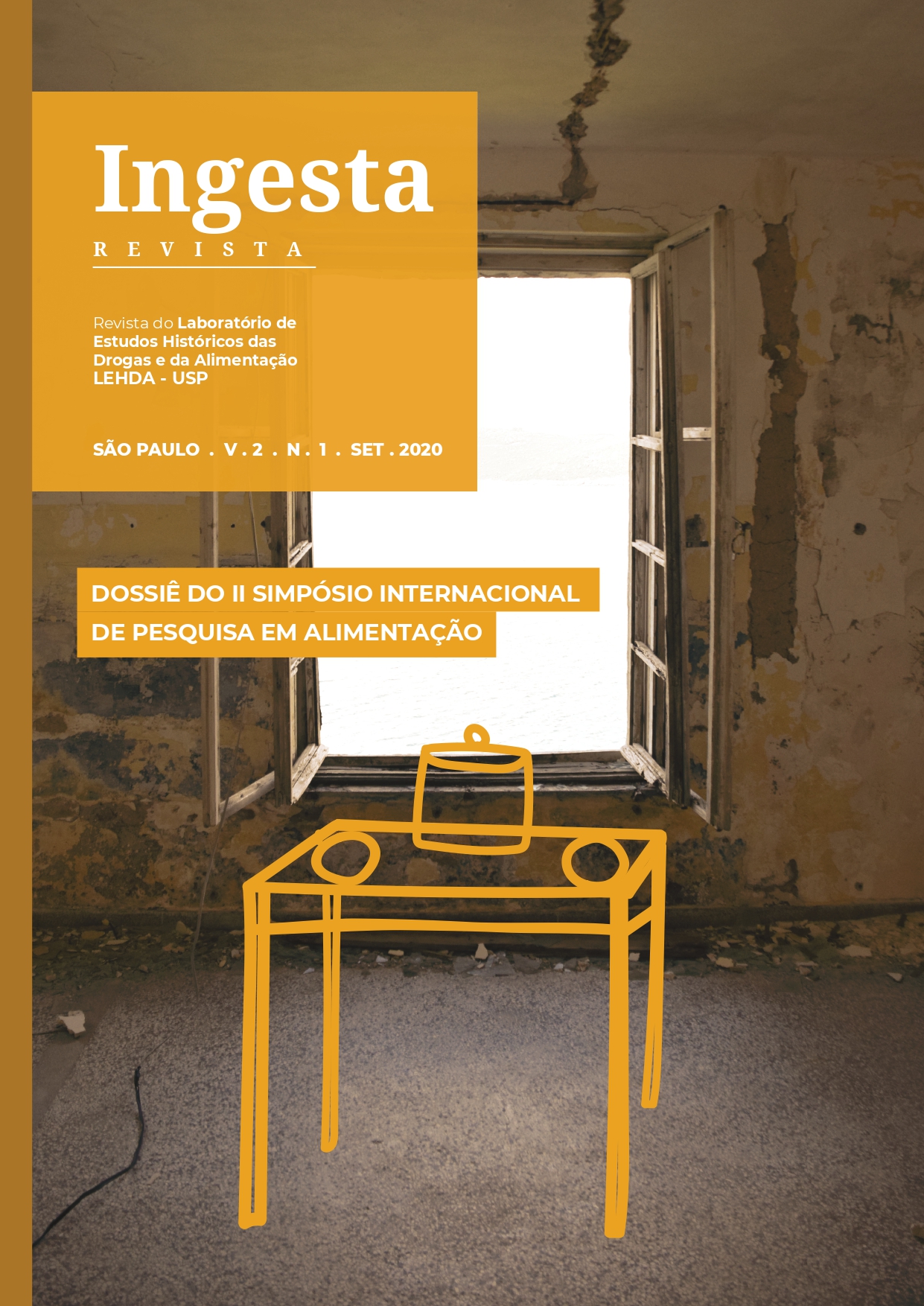Among ingredients, cuisines, and affects: sociocultural aspects of a life dedicated to food
DOI:
https://doi.org/10.11606/issn.2596-3147.v2i1p251-273Keywords:
Food, Affects, Culinary, Memory, CommensalityAbstract
It can be said that to some extent all human beings are affected by food. Among different affinity intensities with food, there is a group that stands out for nurturing a more intense relationship with it: the cooks. Cooks can be seen as humans who walk their lives along with food and dedicate themselves to it daily. This joint journey is part of a historically constructed journey of life, made up of many moments of culinary experience, as well as several symbolic and cultural aspects that precede living the kitchen. In this sense, turning attention to sociocultural and symbolic issues that encompass food is essential to understand how the relationship between cooks and food is built. Cooks were not born with an innate connection to food, they created a powerful affection for food throughout their lives. So how is this close relationship between human cooks and food established? What sociocultural and symbolic aspects help to build this mesh of affects? This article turns to the theoretical analysis of three aspects that are considered important to this relation: the memory, the commensality, and the affection. Food leaves trails in the lives of human beings, it creates powerful memories in the imaginary, gather people together, and evokes everlasting feelings. Reporting these broader aspects is describing a part of the history of food that is fundamental for all human beings, especially cooks.
Downloads
References
CALVO, Manuel. Migration et alimentation. Social Science Information, v. 21, n. 3, p. 383-446, 1982.
CARNEIRO, Henrique Soares. Comida e sociedade: uma história da alimentação. Rio de Janeiro: Campos, 2003.
CONTRERAS, Jesús. Patrimônio e globalização: o caso das culturas alimentares. In: CANESQUI, Ana Maria; GARCIA, Rosa Wanda Diez (orgs.). Antropologia e nutrição: um diálogo possível. Rio de Janeiro: Editora Fiocruz, 2005.
CONTRERAS, Jesús; GRACIA, Mabel. Alimentação, sociedade e cultura. Rio de Janeiro: Editora Fiocruz, 2011.
CSERGO, Julia. A emergência das cozinhas regionais. In: FLANDRIN, Jean-Louis; MONTANARI, Massimo (org). História da alimentação. São Paulo: Estação Liberdade, 2018.
DAMATTA, Roberto. O que faz o brasil, Brasil? Rio de Janeiro: Rocco, 1986.
DELEUZE, Gilles. Proust e os signos. Rio de Janeiro: Forense-Universitária, 1987.
DELEUZE, Gilles. Espinosa: filosofia prática. São Paulo: Escuta, 2002
DELEUZE, Gilles; GUATTARI, Félix. Mil platôs: capitalismo e esquizofrenia. São Paulo: Editora 34, 1995.
FISCHLER, Claude. Commensality, society, and culture. Social Science Information (50th Anniversary Issue), v. 50, p. 528-548, 2011.
FREYRE, Gilberto. Açúcar: uma sociologia do doce, com receitas de bolos e doces do Nordeste do Brasil. São Paulo: Companhia das Letras, 1977.
HALLSTRÖM, Lasse (dir.). Chocolat. Miramax Films, 2000. Longa-metragem (121 min, cor).
HORTA, Nina. O frango ensopado da minha mãe: crônicas de comida. São Paulo: Companhia das Letras, 2015.
INGOLD, Tim. Estar vivo: ensaios sobre movimento, conhecimento e descrição. Petrópolis: Vozes, 2015.
JOANNÈS, Francis. A função social do banquete nas primeiras civilizações. In: FLANDRIN, Jean-Louis; MONTANARI, Massimo (org). História da alimentação. São Paulo: Estação Liberdade, 2018.
LE BRETON, David. Antropologia dos sentidos. Petrópolis: Vozes, 2016.
LÉVI-STRAUSS, Claude. As estruturas elementares do parentesco. Petrópolis: Vozes, 1982.
LÉVI-STRAUSS, Claude. Le triangle culinaire. L’Arc, n. 26, p. 19-29, 1965.
LOCHER, Julie L.; YOELS, William C.; MAURER, Dona; ELLS, Jillian van. Comfort Foods: An Exploratory Journey into The Social and Emotional Significance of Food. Food and Foodways: Explorations in the History and Culture of Human Nourishment, v. 13, n. 4, p. 273-297, 2005.
LONG, Lucy M. Learning to Listen to the Food Voice. Food, Culture & Society, v. 7, n. 1, p. 118-122, 2004.
MINTZ, Sidney W. O poder amargo do açúcar: produtores escravizados, consumidores proletarizados. Recife: Editora Universitária da UFPE, 2003.
MINTZ, Sidney W. Comida e antropologia: uma breve revisão. Revista Brasileira de Ciências Sociais, v. 16, n. 47 p. 31-41, out. 2001.
MONTANARI, Massimo. Comida como cultura. São Paulo: Senac, 2013.
POULAIN, Jean-Pierre. The Sociology of Food: Eating and the Place of Food in Society. Londres: Bloomsbury Academic, 2017.
SIMMEL, Georg. Sociologia da refeição. Estudos Históricos, n. 33, p. 159-166, jan./jun. 2004.
SPINOZA, Benedictus de. Ética. Belo Horizonte: Autêntica, 2009.
VERHAERT, Eva. Asado and Argentine Identity: Representations of the Argentine Roast Tradition in Historical Perspective. Thesis (Masters in Colonial and Global History) – Department of History of the Faculty of Humanities of Leiden University. Leiden, 2018.
TSING, Anna. Arts of Inclusion, or How to Love a Mushroom. Mãnoa, v. 22, n. 2, p. 191-203, 2010.
Downloads
Published
Issue
Section
License
1. Authors retain the copyright and grant the journal the right of first publication, with the work simultaneously licensed under the Creative Commons Attribution License which allows the sharing of work with acknowledgment of authorship and initial publication in this journal.
2. Authors are authorized to take additional contracts separately, for non-exclusive distribution of the version of the work published in this journal (eg. publish in institutional repository or as a book chapter), with acknowledgment of authorship and initial publication in this journal.
3. Authors are allowed and encouraged to publish and distribute their work online (eg. in institutional repositories or on their personal page) at any point before or during the editorial process, as this can generate productive changes as well as increase the impact and the citation of the published work (See The Effect of Free Access).


